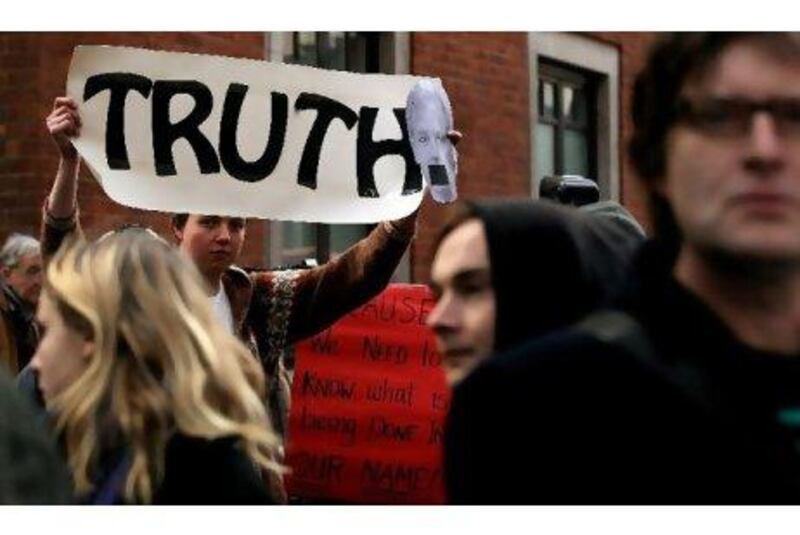LONDON // The WikiLeaks founder will resume his legal battle to be freed from prison today amid fears that, if he fails, the British government computer systems will become targets for cyber attacks.
A judge agreed on Tuesday to free Julian Assange on bail a week after he was arrested and jailed on an extradition warrant from Sweden, where he faces charges of sexually assaulting two women in the summer.
But he was ordered to remain in custody after Swedish prosecutors decided to appeal against bail. A hearing will now be held today before two judges at the High Court in London.
Mark Stephens, the lawyer for the 39-year-old Australian who is behind the current leak of US diplomatic cables, described the Swedish decision to appeal bail as turning the extradition case into "a show trial".
Government ministers in Britain will be watching the outcome of the hearing anxiously because they fear that, if Mr Assange is refused bail, civil service computer systems will be subjected to cyber attacks from his supporters.
Similar attacks were mounted on Visa and MasterCard websites last week after the companies refused to handle further donations to keep WikiLeaks in business.
Mr Assange's supporters see the Swedish prosecutions as a politically motivated attempt to silence him and believe that, if he is sent from the UK to Stockholm for trial, he will soon be extradited to the US to face charges under the Espionage Act.
Sarah Palin, the former Republican vice-presidential candidate, has called for Mr Assange to be hunted down with the same vigour shown towards al Qa'eda suspects.
Sir Peter Ricketts, the UK's national security adviser, warned senior civil servants in London this week that hackers could target government websites if Mr Assange is not freed.
A spokesman for the prime minister, David Cameron, said that Sir Peter had spoken to government department heads about the need to enhance the security of government websites.
"The priority would be websites that dealt with information that belonged to members of the public, such as the Department for Work and Pensions [which handles benefit claims] and Revenues and Customs [which handles tax affairs]," he said.
Mr Assange's detention under a European Arrest Warrant (EAW) has also raised questions about the extradition system that came into force six years ago.
Under the old system, a British court had to be convinced that there was sufficient evidence that a person had committed a crime that was recognisable under British law, before he or she could be extradited.
Now, EAWs only have to be properly drawn up to show a person is facing prosecution in the country requesting extradition - regardless of whether the crime is serious or, even, if it would be recognised as a crime in the UK - for extradition to be granted.
This has enabled major criminals to be brought to justice with a minimum of red tape across Europe.
But it has also led to people being extradited from Britain for stealing cupboard doors in Poland and, in one case, to a man being flown to Warsaw because he went over his bank overdraft limit 10 years ago.
In the Assange case, the sexual assault charges he face appear to centre on whether or not he used a condom during consensual sex with the two women.
Swedish officials brought the assault charges because the women say they demanded Mr Assange use protection but he refused, one of them claiming he had sex with her while she slept.
Under recent interpretations of Swedish law, this can amount to rape or sexual molestation.
Mr Stephens said: "We have a situation where, according to Swedish experts of law, even if he's found guilty, it's very unlikely that [he] would serve a period of imprisonment in Sweden.
"So to keep a man in custody when he wouldn't get a custodial sentence at the end of it is highly unjust."






